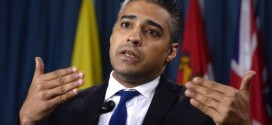By Ahmed A. Yousef
Humans are funny creatures who refuse to learn from their own history. Canada has historically been viewed internationally as a country of peacekeepers. The blue helmets are widely respected and revered for their heroism and willingness to stand up and defend those who have nowhere to turn. However, the Harper government has changed all that. The United States of America’s involvement in Afghanistan funding and arming the Mujahidin against the Soviets led to the rise of the Taliban and Al-Qaeda. Canada did not learn the lesson and went in as part of the coalition in America’s war against those very same organizations and their followers. Canadian soldiers were placed in harm’s way in order to retaliate against the attacks on New York and the Pentagon.
The Bush administration misled the entire world and created a coalition of the willing to illuminate the risk of Iraq’s Weapons of Mass Destruction, none have been found. The catastrophe that exists as a result of Bush’s cowboy policies is an entirely regional conflict, not one that Canada should be throwing its talented young men and women into its meat grinder. Yes, it is a regional conflict that should be handled regionally. The Middle East has some of the most numerous and best equipped armed forces in the entire world. Turkey, Israel, Iran, Egypt, Saudi Arabia, UAE, and Jordan not only account for the lion’s share of the world’s military spending; many of these countries are well-known manufacturers and suppliers of military equipment. So, these big hairy-chested Generals whose countries are directly affected by ISIS are only good for rolling out of bed in the morning and polish their rockets? Don’t they even want to know what’ll happen if they let one off? Yet, Canada and its allies are left to defend the world against ISIS. It’s a regional issue that should be handled regionally. One would assume that Canada would be smarter than to buy into the same lies those governments tell their peoples to keep them impoverished while their budgets bulge. The blow back for external forces who have been involved in military campaigns in the post-cold war era has far outweighed any perceived gains. And, one does not have to look very far south of the Canadian border to see the cost of military involvement in both Afghanistan and Iraq in economic and human terms.
Economic costs are the number, very big numbers, but still just numbers. The human costs are people; mothers, fathers, sons, and daughters both in the countries where the military action is occurring and right back here. And much like the economic costs accrue interest and take generations to pay off so do the human costs. The vicious cycle of violence lives on with the survivors in many forms and takes even longer for its effects on society to dissipate. The toll these involvements and the blow back from them is clear in American society today. For example, the militarization of the police forces is an unintended consequence, which continues to justify itself by selling society the fear of attacks taking place in the homeland. There are signs of this beginning to take hold here in Canada as the Harper government and the media scare Canadians of an evil lurking in the shadows. The government is introducing legislation to combat this evil that will afford the government powers that extend beyond the realm of the checks currently in place. This is a commonly used strategy by governments; expanding the powers of the security forces buys the government at least five years before society starts to complain enough to have legislation that introduces checks on their powers. It’s all in history, if only we humans would learn from the mistakes of others.
Stephen Harper should make a few phone calls to world leaders who have recently involved their countries in military conflicts unnecessarily and ask them how that’s working out for them. George W. Bush, Tony Blair, and Vladimir Putin should be at the top of that list. All three leaders attended military funerals for the young bright and irreplaceable men and women who gave their lives during these campaigns. All three attended funeral services for civilians whose demise came at the hands of those claiming to avenge something or another directly related to the military action. And, all three are credited with sharp declines in the economies of their respective countries following these military campaigns. Why then would Canada want to shed the honored and revered blue helmets and repeat the historical mistakes of others?
 The Arab Democrat The Latest From The Arab World
The Arab Democrat The Latest From The Arab World






